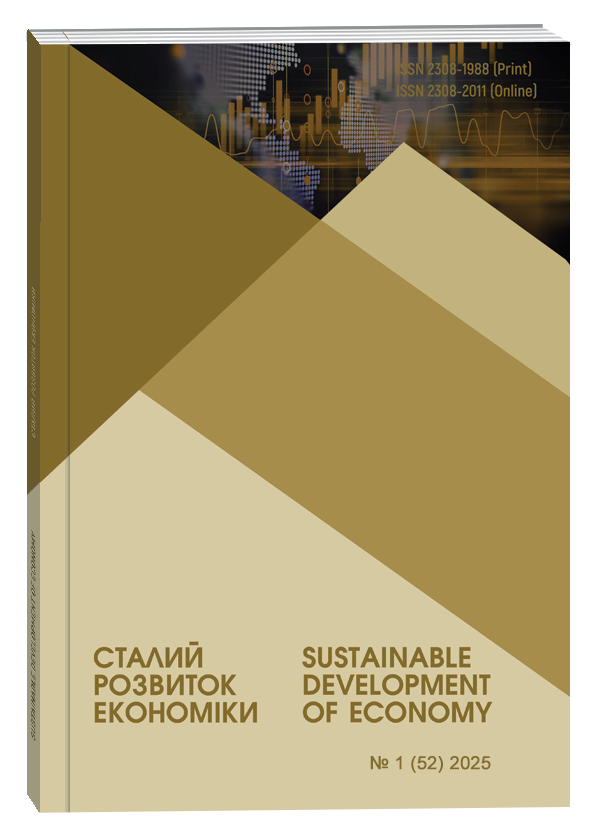STRATEGIC MANAGEMENT OF THE UNIVERSITY'S ECONOMIC SUSTAINABILITY
Abstract
The article is devoted to the strategic management of universities' economic sustainability in the context of digital transformations. The study examines the main approaches to ensuring the economic sustainability of higher education institutions, which are particularly relevant in the era of globalization and technological change. The impact of digitalization on university management processes is analyzed, focusing on the integration of advanced technologies, resource optimization, and increased financial efficiency. The role of digital tools in reducing the costs of educational services, improving management processes, and enhancing the competitiveness of universities is explored. A comprehensive model of strategic management of economic sustainability is proposed, encompassing financial flow assessment, cost management, investment analysis in digital technologies, and their integration into university development strategies. The model aims to enhance resilience to economic challenges, ensure stability, and increase competitiveness in the educational services market.
References
Copeland, T., Koller, T., & Murrin, J. (1999). Company valuation. Budapest: Panem – John Wiley & Sons.
Norton, D., & Kaplan, R. (2003). Balanced Scorecard. From strategy to action. CJSC "Olymp-Business".
Yahodzynskyi, S. M. (2015). Hlobalni informatsiini merezhi u sotsio-kulturnii perspektyvi: monohrafiia [Global information networks in socio-cultural perspective: monograph]. Kyiv: Ahrar Media Hrup. (in Ukrainian)
Karpliuk, S. O. (2019). Osoblyvosti tsyfrovyzatsii osvitnoho protsesu u vyshchii shkoli. In Informatsiyno-tsyfrovyi osvitnii prostir Ukrainy: transformatsiini protsesy i perspektyvy rozvytku [Information and digital educational space of Ukraine: transformational processes and development prospects] (pp. 188–197). Materials of the methodological seminar of the National Academy of Pedagogical Sciences of Ukraine. (in Ukrainian)
Sklyarenko, O. V., Yahodzynskyi, S. M., Nikolayevskyi, O. Y., & Nevoroz, A. V. (2024). Tsyfrovi interaktyvni tekhnolohii navchannia yak nevidiemna skladova suchasnoho osvitnoho protsesu [Digital interactive technologies of learning as an integral part of the modern educational process]. Innovatsiina pedahohika, no. 68(2), pp. 51-55. DOI: https://doi.org/10.32782/2663-6085/2024/68.2.51 (in Ukrainian)
Khomenko, O. O., Paustovska, M. V., & Onyshchuk, I. A. (2024). Vplyv interaktyvnykh tekhnolohii na protses navchannia i rozvytok zdobuvachiv vyshchoi osvit. [The impact of interactive technologies on the learning process and the development of higher education applicants]. Naukovi innovatsii ta peredovi tekhnolohii, no. 5(33), pp. 1222-1231. DOI: https://doi.org/10.52058/2786-5274-2024-5(33)-1222-1231 (in Ukrainian)
Dushchenko, O. (2021). Suchasnyi stan tsyfrovoi transformatsii osvity. [The current state of digital transformation in education]. Fizyko-matematychna osvita, no. 28(2), pp. 40–45. DOI: https://doi.org/10.31110/2413-1571-2021-028-2-007 (in Ukrainian)
Kozhyna, A. (2022). Reducing poverty, inequality, and social exclusion in European countries. Economics and Management of The National Economy, The Crisis of National Models of Economic System, pp. 29-32. DOI: https://doi.org/10.30525/978-9934-26-269-2-7
Williamson, B., Eynon, R., & Potter, J. (2020). Pandemic politics, pedagogies and practices: digital technologies and distance education during the coronavirus emergency. Learning, Media and Technology, no. 45(2), pp. 107–114. DOI: https://doi.org/10.1080/17439884.2020.1761641
Verina, N., & Titko, J. (2019). Digital transformation: conceptual framework. In Contemporary Issues in Business, Management and Economics Engineering (pp. 719–727). DOI: https://doi.org/10.3846/cibmee.2019.073
Kubiv, S. I., Bobro, N. S., Lopushnyak, G. S., Lenher, Y. I., & Kozhyna, A. (2020). Innovative potential in European countries: analytical and legal aspects. International Journal of Economics and Business Administration, no. 8(2), pp. 250-264. DOI: https://doi.org/10.35808/ijeba/457
Lopuschnyak, H. N., Chala, O., & Poplavska, O. (2021). Socio-economic determinants of the ecosystem of sustainable development of Ukraine. IOP Conf. Series: Earth and Environmental Science, pp. 1–9. DOI: https://doi.org/10.1088/1755-1315/915/1/012019
Bobro, N. S. (2024). Tsyfrova platforma yak suchasna orhanizatsiina innovatsiia. [Digital platform as a modern organizational innovation]. Investytsii: praktyka ta dosvid, no. 1, pp. 63-66. DOI: https://doi.org/10.32702/2306-6814.2024.1.63 (in Ukrainian)
Kaku, M. (2019). 10 robots, artificial intelligence, and the future of work. In Environmental Health and the US Federal System: Sustainably Managing Health Hazards (p. 254).
Copeland T., Koller T., Murrin J. Company Valuation. Budapest: Panem – John Wiley & Sons, New York, 1999. 321 р.
Norton D., Kaplan R. Balanced Scorecard. From Strategy to Action. CJSC "Olymp-Business", 2003. 189 р.
Ягодзінський С.М. Глобальні інформаційні мережі у соціокультурній перспективі: монографія. Київ : Аграр Медіа Груп, 2015. 276 с.
Карплюк С.О. Особливості цифровізації освітнього процесу у вищій школі. Інформаційно-цифровий освітній простір України: трансформаційні процеси і перспективи розвитку: матеріали методологічного семінару НАПН України. 2019. С. 188–197.
Скляренко О.В., Ягодзінський С.М., Ніколаєвський О.Ю., Невзоров А.В. Цифрові інтерактивні технології навчання як невід’ємна складова сучасного освітнього процесу. Інноваційна педагогіка. 2024. № 68 (2). С. 51-55. DOI: https://doi.org/10.32782/2663-6085/2024/68.2.51
Хоменко О.О., Паустовська М.В., Онищук І.А. Вплив інтерактивних технологій на процес навчання і розвиток здобувачів вищої освіти. Наукові інновації та передові технології. 2024. № 5(33). С. 1222-1231. DOI: https://doi.org/10.52058/2786-5274-2024-5(33)-1222-1231
Дущенко О. Сучасний стан цифрової трансформації освіти. Фізико-математична освіта. 2021. 28(2), С. 40–45. DOI: https://doi.org/10.31110/2413-1571-2021-028-2-007 (дата звернення 01.12.2024)
Kozhyna A. Reducing Poverty, Inequality and Social Exclusion in European Countries. Based on Inclusive Approaches to Economic Development. Economics and Management of The National Economy, The Crisis of National Models of Economic System, 2022. С. 29-32. DOI: https://doi.org/10.30525/978-9934-26-269-2-7
Williamson B., Eynon R., Potter J. Pandemic Politics, Pedagogies and Practices: Digital Technologies and Distance Education During the Coronavirus Emergency. Learning, Media and Technology. 2020. 45(2), С. 107–114. DOI: https://doi.org/10.1080/17439884.2020.1761641
Verina N., Titko J. Digital Transformation: Conceptual Framework. In Contemporary Issues in Business, Management and Economics Engineering. 2019. С. 719–727. DOI: https://doi.org/10.3846/cibmee.2019.073
Kubiv S.I., Bobro N.S., Lopushnyak G.S., Lenher Y.I., Kozhyna A. Innovative Potential in European Countries: Analytical and Legal Aspects. International Journal of Economics and Business Administration. 2020. 8(2), С. 250-264. DOI: https://doi.org/10.35808/ijeba/457
Lopuschnyak H.N., Chala O., Poplavska O. Socio-economic Determinants of the Ecosystem of Sustainable Development of Ukraine. IOP Conf. Series: Earth and Environmental Science, 2021. 1. С. 1-9. DOI: https://doi.org/10.1088/1755-1315/915/1/012019
Бобро Н.С. Цифрова платформа як сучасна організаційна інновація. Інвестиції: практика та досвід. 2024. № 1. С. 63-66. DOI: https://doi.org/10.32702/2306-6814.2024.1.63
Kaku M. 10 Robots, Artificial Intelligence, and the Future of Work. Environmental Health and the US Federal System: Sustainably Managing Health Hazards, 2019. С. 254.


